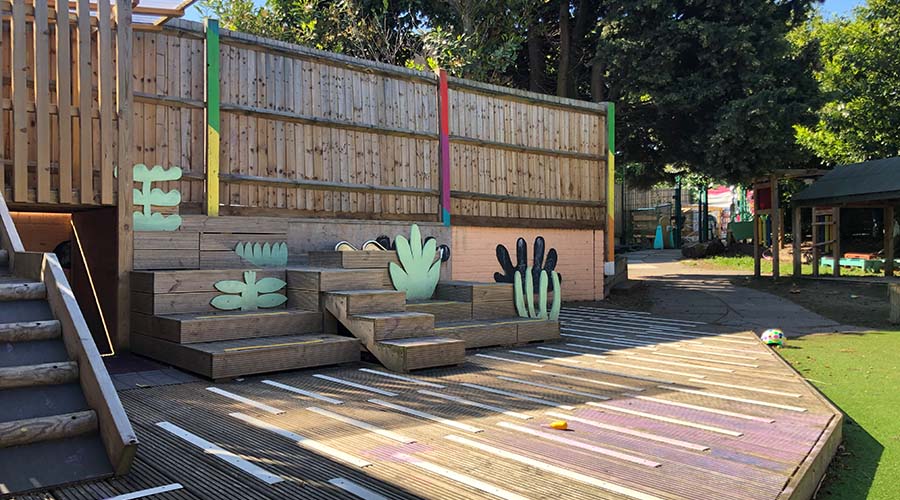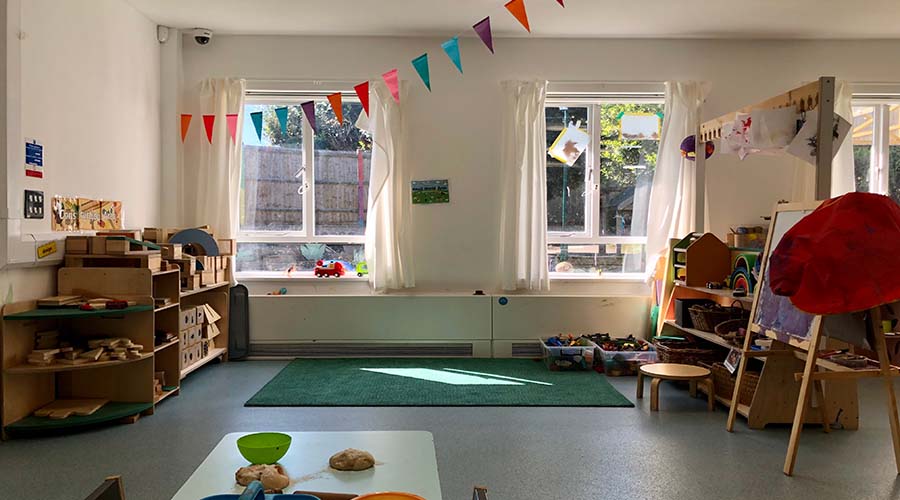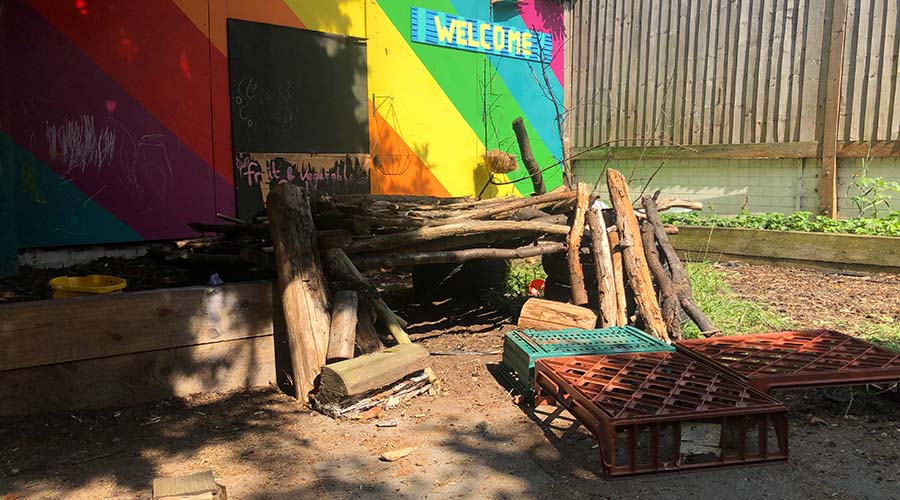Parent-led nursery
Deptford, London
2, 3, and 4-year-old funded places
1
settings
26
children
With Famly since
November 2021
What if I told you there was a way to reduce the cost of running a childcare setting and actually increase the quality of care?
I can hear the cups of tea clattering to the floor of nursery offices as you read this, but it’s true. Based in Deptford, London, Friendly Families Community Nursery seems to have done just that.
Set up by a group of local parents in 2019 (with some funding and support,) Friendly Families has three full-time professional Early Years staff. However, what makes Friendly Families so unique is that the setting is actually led by parents working as directors and volunteers, alongside the three paid staff.
The parents get money off their childcare fees in return for their voluntary work in the setting, helping to keep costs down for everyone. The extra pairs of hands support teaching, caring, repairing, innovating, and generally doing whatever else needs doing. And what’s more, parents get to have a direct impact on their child’s setting and Early Education.
I sat down with parent-director Ouma Mauree to find out what it means to be a ‘parent-led’ setting and how Friendly Families actually works.
Let’s get into it.
The big ideas
- The ultimate parent partnerships
What better way to partner with parents than to have them work alongside educators? Parents get more affordable childcare, and the children get care from the people who know them best. - Good value and good quality
The focus at Friendly Families isn’t just on affordability, but really good quality childcare. Having more adults present means more attention, expertise, experience, and support for the children, meaning better care. - More than just money offParent-director Ouma explains that, although parents do get money off their fees for volunteering, the real incentive is to contribute to the community, and have an impact on the setting and their child’s care.
What is parent-led childcare?
- Parent-led childcare puts local parents at the helm of organising and delivering a local childcare service to help make sure families’ childcare needs are met and help keep childcare costs low. From planning out what the childcare service will look like to sitting on the management board and recruiting early years professionals, parents play a key role in creating a service that works for their neighbourhood.
Friendly Families Community Nursery
- Parent-led co-operative models of childcare combine decent pay and conditions for staff with real control and affordability for parents who contribute time and skills to the management of the nursery.
The New Economics Foundation
When children start at Friendly Families, the manager chats to their parents about how they could contribute to the setting. This might be in the form of administration, helping in the classroom, or gardening, for example, depending on the skills and preferences of the parents. Parents have the option to volunteer directly with the children or become a parent-director (more on that below).
“We’ve got parents that help with marketing. We have another parent-director who leads on finance,” explains Ouma, “Another parent is our Ofsted representative, and as she happens to be qualified in Early Years, she offers some coaching and support. We also have parents who look after the garden or do DIY. It’s a real mix.”
But how does it work?
In order to give parents more choice about how involved they are in the setting, there are different ‘levels’ of volunteers at Friendly Families.

Parent-directors
Ouma is a parent-director, so she volunteers as part of the board, and is more responsible for the running of the setting. All five parent-directors are unpaid volunteers, so this is where the setting really saves on expenses, but in return, these parents have full control of their child’s care and the setting.
Parent volunteers
A team of classroom volunteers work alongside three full-time, professional Early Years staff.
They attend one day a week, while their own child is in the setting, and receive that session for free, as well as a 15% discount on their fees overall. This is less responsibility than the parent-directors have, giving parents a choice, although classroom volunteers do count in the setting’s ratios.
And if parents work full time and aren’t able to volunteer, they pay full fees, so they’re contributing financially.
For some parents, the chance to work alongside their child, contributing to their care and community is a dream come true. But for others, the thought can be intimidating.
“Not every parent is comfortable with it,” explains Ouma, “So we’re still learning how best to educate parents about it. We want parents to feel like they want to do this. And of course, there’s the collective benefit of reduced fees by having volunteer parents bringing their own expertise.”
But truly working in partnership with parents also means respecting the different levels of willingness or ability to contribute.
“It didn’t happen on day one,” explains Ouma, “This last year we’ve been reviewing our operating model in regards to how to make the volunteering work and because of the rising cost of living. We want all the parents to feel involved (and be transparent about how) while keeping fees as low as possible.”


“The educators themselves go through a journey from working with parents as customers to seeing parents as partners. Staff need to be comfortable with allowing parents into the room and training them on the do’s and don’ts.”
Ouma Mauree
Good value and good quality
“We’re a charity. We’re not-for-profit,” explains Ouma, “We’re not driven by margins or maximum occupancy. We’re bringing the community together.”
Where most settings are staffed to ratio and not beyond, the parent volunteers at Friendly Families means there are extra, familiar adults available to support the children in their learning and play. This is key to good quality care, as higher adult-to-child ratios are linked to better developmental outcomes for children.
The board encourages parents to contribute personal skills or professional expertise to the setting, outside of working directly with the children. As a project manager and consultant within IT, Ouma is the parent-director leading on marketing, parental and community engagement, and the setting’s digitisation project, as well as supporting finance. Other parents work on the website, or help run Friendly Families’ social media.
With all this help from parents, Friendly Families has the extra resources to pay the staff a living wage and allocate a training budget. They have the ability to work flexible hours, in order to complete their further education. This means staff stay at the setting, ultimately improving outcomes for the children.
The parent-led approach also feeds into the practice at the setting. The family focus means the children play in a mixed-age group, and learn from one another like siblings would at home.
“Settling in, for example, goes at the family’s own pace,” explains Ouma, “Given the freedom and space to stay as long as they need, the settling is more effective. So far, it’s actually never taken longer than two weeks.”

More than just money off
While a discount on fees is certainly a welcome bonus for most parents, Friendly Families offers a lot more than that. Like many families with relatives in other countries, Ouma found that the community around Friendly Families provides support and belonging, because of the combined sense of purpose of the parents and staff working together.
“We don’t have our extended family here in the UK.And especially with Covid, we didn’t have easy access to friends. Being involved in the project has been a great way of building a support network of like-minded parents,” Ouma says. “We talk about key workers, but actually everyone knows everyone here.
“We talk about key workers, but actually everyone knows everyone,” smiles Ouma.
Parents have the option to make a regular commitment to the nursery as a classroom helper (one day a week, 9am to 3pm), alongside trained members of staff. That family will then receive free childcare on the day that they volunteer and a 15% discount on their overall fees.
Parents also have the opportunity to be deeply involved in their child’s care. Being able to stay at their child’s setting all day to volunteer provides parents more time with their child (and their child’s friends) and have a direct impact on the provision delivered. Plus, working with childcare professionals supports their development as parents.
“It allows parents to learn,” explains Ouma, “They get trained in a new skill, childcare, so if they need a job in childcare in the future, they can use this experience.”
For Ouma, it’s knowing that she's contributing to making the setting the best it can be.
“My son is here,” she explains, “And the setting really is amazing. Even on the weekend, he asks to come to nursery! I want it to be the best of the best.”
Top tips from Alphabet House
Get top tips from a setting just like yours. Hear from Alphabet House on why and how they use Famly - and why they’ve never looked back.
Read their story










